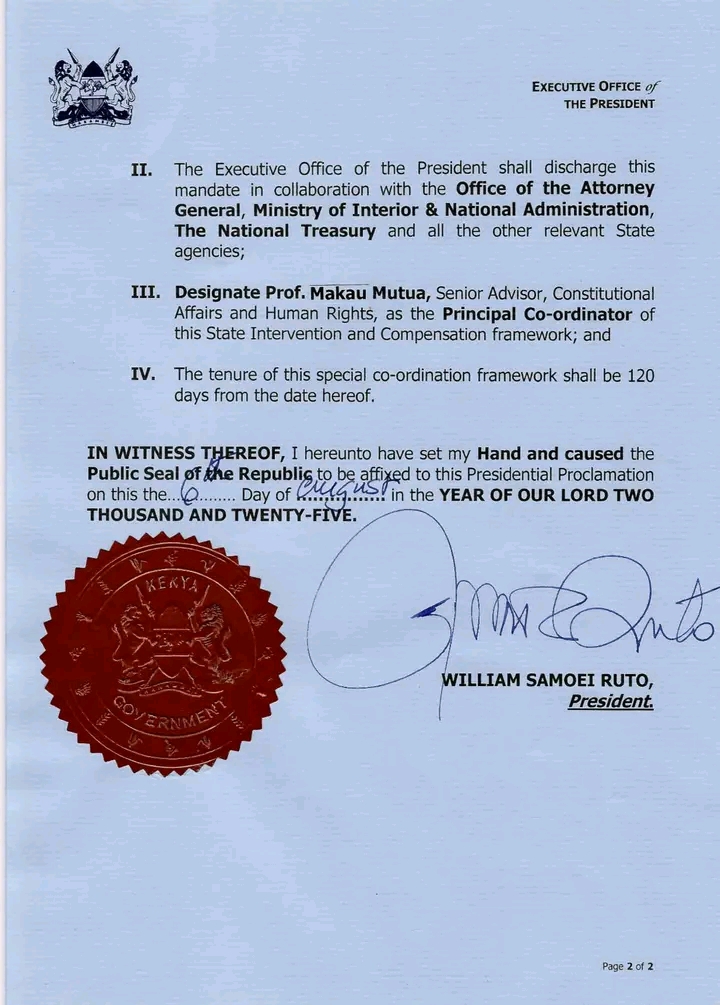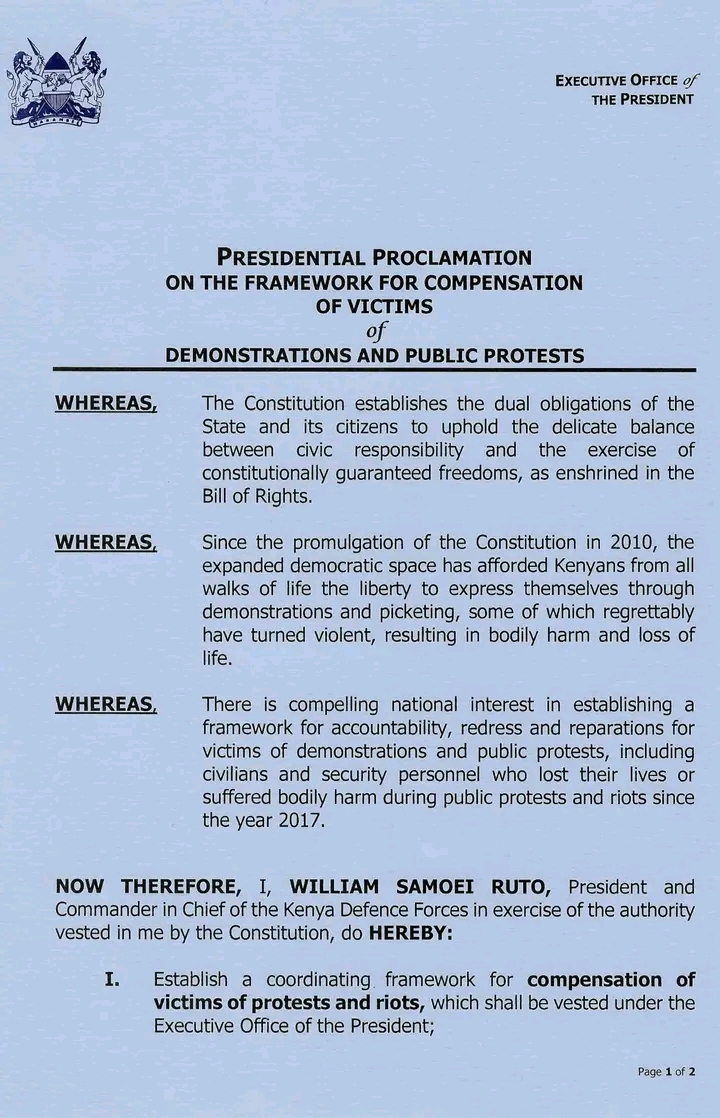Nairobi, Kenya| In a groundbreaking move that has reverberated across Kenya and beyond, President William Samoei Ruto has issued a Presidential Proclamation establishing a national framework to compensate victims of demonstrations and public protests dating back to 2017.
This unprecedented initiative, announced on August 8, 2025, marks a transformative step in Kenya’s human rights landscape, aiming to deliver justice and reparations to civilians and security personnel who have suffered bodily harm or lost their lives during protests and riots.
The framework, set to operate for 120 days, is poised to address the human and economic toll of violent unrest while reinforcing the delicate balance between constitutional freedoms, civic responsibility, and public safety.
A Visionary Framework for Transitional Justice
The initiative, managed under the Executive Office of the President, is led by Prof. Makau Mutua, a distinguished legal scholar and Senior Advisor on Constitutional Affairs and Human Rights.
Appointed as the Principal Coordinator, Prof. Mutua will work closely with the Office of the Attorney General, the Ministry of Interior and National Administration, the National Treasury, and other state agencies to identify victims and facilitate compensation.
The framework responds to long-standing calls for accountability, particularly in the wake of the tumultuous protests of 2023 and 2024, and aligns with recommendations from the National Dialogue Committee (NADCO).
President Ruto’s proclamation underscores Kenya’s commitment to addressing the scars left by civil unrest.
By focusing on victims of protests since 2017—a period marked by significant political and social upheavals—the initiative seeks to provide closure to families and individuals affected by violence, while setting a global precedent for transitional justice.
“This bold, unprecedented, and historic action by President Ruto is transformational for Kenya’s human rights culture,” Prof. Mutua stated, emphasizing the pioneering nature of the framework. “Visionary leaders seize historic opportunities, as President Ruto has done. This action is unique in Africa and around the globe.”
Prof. Makau Mutua: A Champion for Justice
Prof. Makau Mutua, a globally recognized expert in constitutional law and human rights, expressed profound gratitude for his appointment, describing it as an “awesome responsibility.”
In a heartfelt statement, he thanked President Ruto for his visionary leadership and acknowledged former Prime Minister Raila Odinga for his role in supporting this historic journey.
“I have taught, written, fought for, lectured on, and practiced the law of transitional justice for close to three decades, and I never thought such a pioneering action would occur in Kenya in my lifetime,” Mutua said. “I promise the President and the country that we will rise to the challenge. Aluta continua!”
Mutua’s extensive background in human rights advocacy and transitional justice positions him as a fitting leader for this initiative.
His team, operating under a tight 120-day timeline, faces the monumental task of identifying eligible victims, assessing claims, and determining appropriate reparations.
While specific details regarding compensation mechanisms and funding remain undisclosed, the framework is expected to prioritize transparency, inclusivity, and efficiency to ensure justice is delivered swiftly and equitably.
Addressing the Human and Economic Costs of Protests
Kenya has witnessed a series of protests over the years, often sparked by political tensions, economic grievances, or demands for social justice.
The 2023 and 2024 demonstrations, in particular, drew widespread attention due to their scale and intensity, resulting in significant loss of life, injuries, and property damage.
These events underscored the urgent need for a structured approach to address the consequences of civil unrest, both for victims and for society at large.
President Ruto’s proclamation seeks to balance the constitutional right to assembly and expression with the imperative of maintaining public safety.
By acknowledging the human and economic costs of protests, the framework aims to foster reconciliation and strengthen Kenya’s democratic fabric.
The initiative also responds to recommendations from NADCO, a body tasked with facilitating dialogue and proposing solutions to national challenges, further anchoring it in a broader commitment to national healing and accountability.
A Global Benchmark for Human Rights
The establishment of this framework is a landmark moment not only for Kenya but for the African continent and the global human rights community.
As Prof. Mutua noted, the initiative is unparalleled in its scope and ambition, positioning Kenya as a trailblazer in addressing the aftermath of civil unrest.
By prioritizing reparations for both civilians and security personnel, the framework acknowledges the shared suffering experienced during protests, fostering a sense of collective healing.
The 120-day timeline reflects the urgency of the task, with Prof. Mutua’s team expected to collaborate closely with state agencies to ensure a streamlined process.
While challenges such as funding, victim identification, and the scale of claims may arise, the government’s commitment to transparency and stakeholder engagement will be critical to the initiative’s success.
A Call to Action and Unity
President Ruto’s decision to establish this framework has been met with widespread acclaim, with many viewing it as a bold step toward addressing historical grievances and building a more just society.
Prof. Mutua’s leadership, coupled with the involvement of key government institutions, signals a collaborative approach to tackling one of Kenya’s most pressing human rights challenges.
As the nation awaits further details on the compensation process, the proclamation serves as a powerful reminder of the importance of accountability, empathy, and justice in a democratic society.
For victims and their families, this initiative offers hope for recognition and redress. For Kenya, it represents a historic opportunity to lead by example on the global stage.
What Next?
President William Ruto’s proclamation on August 8, 2025, marks a defining moment in Kenya’s journey toward justice and reconciliation.
By establishing a national framework to compensate victims of protests since 2017, Kenya is taking a bold step toward healing the wounds of its past while setting a global standard for human rights.
Under the leadership of Prof. Makau Mutua, this initiative promises to deliver justice to those affected by civil unrest, reinforcing the nation’s commitment to constitutional freedoms and civic responsibility.
As the 120-day timeline unfolds, all eyes will be on Kenya to see how this visionary framework transforms lives and shapes the future of human rights in Africa.
For more information on Kenya’s human rights initiatives or to follow updates on the compensation framework, visit the official government portals or stay tuned to trusted news sources including ICBNews.
Share This Post








